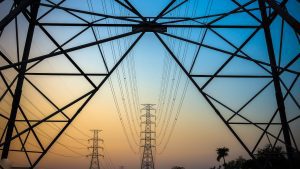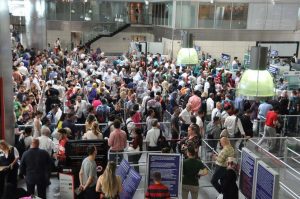
After tests at power unit No. 3 of Yuzhnoukrainsk nuclear power plant (NPP), the program for testing excitation systems of turbine generators of power units of Ukrainian NPPs, included in the catalog of measures of the agreement on the terms of future integration of the united energy system of Ukraine with the European Network of Transmission System Operators for Electricity ENTSO-E, has been successfully completed.
According to the website of Energoatom, in addition to specialists of Energoatom and Ukrenergo, representatives of the ENTSO-E Consortium and DMSS-Engineering with the support of the USAID Energy Security Project took part in testing the excitation systems of turbine generators.
The company recalled that Energoatom began this program on August 17, 2020 together with Ukrenergo as part of checking the compliance of the domestic generation with the ENTSO-E technological standards. Corresponding tests were carried out at power unit No. 2 of Rivne NPP, No. 1 of Zaporizhia NPP, as well as power units No. 1 and No. 3 of Yuzhnoukrainsk NPP.
According to Energoatom, on the basis of research data, the ENTSO-E Transmission System Operators Consortium (EMC, MAVIR, PSE, SEPS, 50Hertz and Transelectrica) will create a common mathematical model of the synchronous operation of the Ukrainian and European power systems. Also, this information will be used to study the static and dynamic stability of the united energy system of Ukraine, provided that it works in parallel with ENTSO-E.
Energoatom noted that Ukrenergo signed a service contract for the implementation of this item in the catalog of events with the CONSORTIUM in 2019.
At the same time, commenting on the completion of the tests, the Ministry of Energy noted on the website that in addition to the planned technical measures, in order to successfully complete the synchronization, it is necessary to certify the transmission system operator in accordance with the requirements of the Third Energy Package of the EU.
ENERGOATOM, ENERGY SYSTEM, ENTSO-E, SYNCHRONIZATION, UKRENERGO
Main trade partners of Ukraine in % from total volume (export from Ukraine to other countries) in Jan-July of 2020.

Source: SSC of Ukraine

Passenger traffic at Kyiv Sikorsky International Airport in January-September 2020 amounted to 600,600 passengers, which is 70.1% less than in the same period in 2019.
According to the airport’s website, the number of passengers served on international flights amounted to 589,500, on domestic flights some 11,100.
The number of flights in January-September 2020 amounted to 9,800 for arrivals and departures, which is 53.9% less than the same period in 2019, of which international flights amounted to 7,820, domestic to 1,980.
The most popular international destinations since the beginning of 2020 are Minsk (Belarus), Warsaw (Poland), Vienna (Austria), Berlin (Germany), London (the UK), Memmingen and Dortmund (Germany), and domestic are Zaporizhia, Dnipro and Odesa.
In September 2020, the airport served 51,100 passengers, which is 66.8% less than in September 2019. The number of passengers served on international flights is 49,100, on domestic flights some 2,000 passengers.
The number of flights in September 2020 amounted to 1,285 for arrival and departure, which is 19.7% less than in the same period in 2019, of which 945 international flights, and 340 domestic flights.

The airports of Ukraine in January-September 2020, according to recent data, served 6.857 million passengers, which is 62.9% less than in the same period in 2019.
According to the website of the State Aviation Administration of Ukraine, in international traffic, the passenger traffic of Ukrainian airports during this period decreased by 63.7%, to 6.063 million people.
According to the statistics of the service, in January-September of this year, Ukrainian airlines served almost 3.770 million people, which is 64.7% less than in the same period in 2019. Of these, 3.380 million people were transported in international traffic (a reduction of 65.4% in the same comparison).
At the same time, in the first nine months of 2020, Ukrainian airlines performed 33,500 commercial flights (a decrease by 58%), including 26,700 international ones (60.1% less).
As reported, the airports of Ukraine in 2019 served 24.337 million passengers, which is 18.5% more than in 2018.

Three of the best designs will debut at a key European design and innovation event
Kyiv, October 15, 2020. — From 17 to 25 October, Ukrainian designers will take part in the Dutch Design Week — the largest design event in Northern Europe. This year, our country will be represented by three teams who have won the competition within the framework of the international European Design Upgrade project. The project is being implemented in partnership with K.Fund, GoLocal and Brussels Creative, Belgium and Urban Mill, Finland.
“At the time of serious global changes in Europe and the world, Ukraine’s participation in the role of the leader of the international consortium of cultural institutions is especially important. In the process of implementing the project, Ukrainian designers and mentors exchanged a huge number of ideas with Finnish and Belgian partners and enriched each other with invaluable experience,” Olena Dobrorodneva, Vice President of K.Fund, conceptual leader of European Design Upgrade project, said.
“The European Design Upgrade project has shown how resilient our creative community is. We are often pointed as the future engine of the European economy. And I think the Covid-19 challenges will increase the importance of this role. During the pandemic, our program changed into a hybrid format – and as a result we got a lot of new and inspiring ideas, and cross-cultural teams made projects more creative and multidisciplinary,” Alan Heureux, co-founder of Brussels Creative, said.
The participation of Ukrainian designers in Dutch Design Week was preceded by a lecture program, a hackathon, prototyping and competitive selection, according to which three winning teams were selected from 37 applicants. All projects have a social impact and are trying to solve acute social problems.
• The authors of the Nano Retention project have developed a special biomaterial that can retain water and block the noise of the city. To do this, designers use bacterial cellulose -— a material that bacteria produce during the fermentation of kombucha.
• The Changeable project team creates removable textile and 3D printed prosthesis covers. This approach allows not to hide the prosthesis, but to make out of it a stylish accessory.
• Prints on clothes from the Pink Glasses project in ultraviolet light are complemented with new details – and highlight the problems of global warming, pollution, war or discrimination.
During Dutch Design Week, Ukrainian designers plan to hold presentations and meetings online. Details will be published on the project’s Facebook page.
In addition, on October 22 at 10.30 am within the framework of Dutch Design Week in the UNIT.City innovation park (UNIT.Core premises), an exhibition of the design projects of finalists will be held. It will open with an international discussion “What is radical creativity?”. During the discussion the experts from Belgium, Finland and Ukraine will talk about the challenges that the Ukrainian creative ecosystem is facing and discuss opportunities for development and cooperation.
ADDITIONAL INFORMATION
Dutch Design Week is the largest annual design event in Northern Europe that presents works and concepts from over 2,600 designers to over 355,000 visitors.
K.Fund was founded by Ukrainian entrepreneur Vasyl Khmelnytsky in 2015 to support projects in the field of education and economics. K.Fund’s mission is to provide keys for development and implementation, provide opportunities for acquiring new knowledge and skills, to promote discoveries and help to reach a new level.
The project is funded with the support of the European Commission. The publication reflects solely the views of the author and the Commission cannot be held responsible for any use of the information contained therein.
The project is funded with the support of the Ukrainian Cultural Foundation.

The Cabinet of Ministers of Ukraine published a decree by which it amended the criteria for adaptive lockdown and extended its validity until the end of 2020.
The text of decree No. 956 dated October 13 on amendments to decree No. 641 dated July 22 was released on the government’s official website.
The decree restricts the opening hours of restaurants and other catering establishments from 22:00 to 07:00, and also tightens the restriction on holding mass events (no more than 50 people in the “green” zones, up to 30 people in the “yellow,” up to 20 people in the “orange”). The Cabinet of Ministers also banned spectators from visiting sports events, except for international ones, on which the Health Ministry will make another decisions.
In addition, it is recommended that all business entities organize shift work of employees, if it is technically possible to work in real time via the Internet while maintaining salaries.
It is recommended that institutions of general secondary education establish holidays from October 15 to October 30, 2020, and institutions of vocational and higher education from October 15 to November 15, 2020 switch to distance learning with the recommended departure of students from hostels, except for those who cannot do this.
According to the decree, the State Service for Food Safety and Consumer Protection should strengthen public control over compliance with sanitary legislation and anti-epidemic measures in the work of preschool education institutions, catering, physical education and sports, and trade.
Local authorities are advised to use additional units of public transport in order to avoid crowding in it and monitor compliance with anti-epidemic standards in the implementation of transportation.